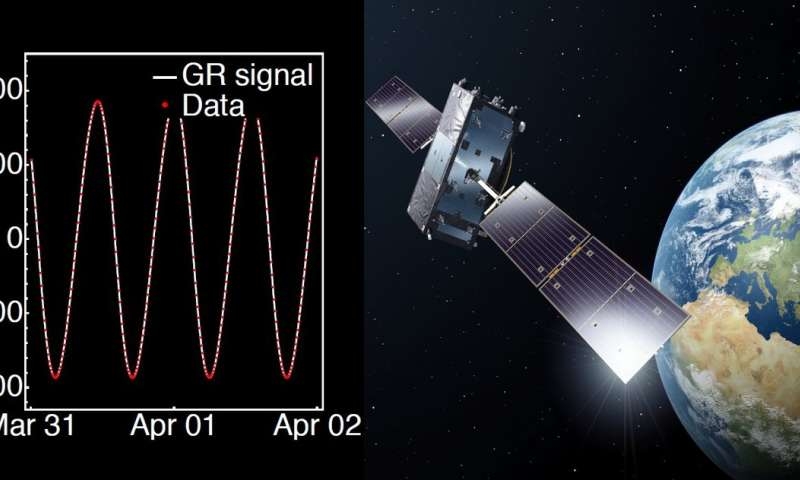Galileo satellites prove Einstein's Relativity Theory to highest accuracy yet

The relativistic eccentricity of Galileo satellites 5 and 6 reaches a peak amplitude of approximately 370 nanoseconds (billionths of a second), driven by the shifting altitude, and hence changing gravity levels, of their elliptical orbits around Earth. A periodic modulation of this size is clearly discernible, given the relative frequency stability of the Passive Hydrogen Maser atomic clocks aboard the satellites. Credit: European Space Agency
December 5, 2018, European Space Agency
Europe's Galileo satellite navigation system – already serving users globally – has now provided a historic service to the physics community worldwide, enabling the most accurate measurement ever made of how shifts in gravity alter the passing of time, a key element of Einstein's Theory of General Relativity.
Two European fundamental physics teams working in parallel have independently achieved about a fivefold improvement in measuring accuracy of the gravity-driven time dilation effect known as 'gravitational redshift.'
The prestigious Physical Review Letters journal has just published the independent results obtained from both consortiums, gathered from more than a thousand days of data obtained from the pair of Galileo satellites in elongated orbits.
"It is hugely satisfying for ESA to see that our original expectation that such results might be theoretically possible have now been borne out in practical terms, providing the first reported improvement of the gravitational redshift test for more than 40 years," comments Javier Ventura-Traveset, Head of ESA's Galileo Navigation Science Office.
"These extraordinary results have been made possible thanks to the unique features of the Galileo satellites, notably the very high stabilities of their onboard atomic clocks, the accuracies attainable in their orbit determination and the presence of laser-retroreflectors, which allow for the performance of independent and very precise orbit measurements from the ground, key to disentangle clock and orbit errors."
See also the 2015 announcement
Galileo satellites set for year-long Einstein experiment